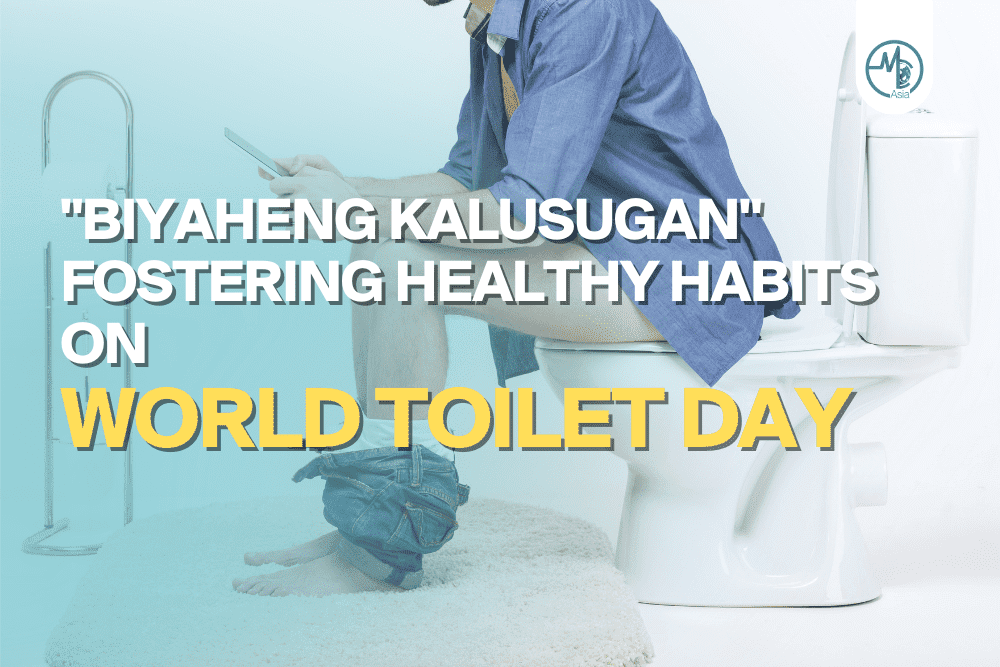The Department of Health (DOH) recently marked World Toilet Day as part of its proactive community engagement program, “Biyaheng Kalusugan.”
The event, held on November 18, 2023, at GMALL Cebu City, was not just a celebration but a comprehensive effort to disseminate practical knowledge and promote the “7 Healthy Habits para sa Healthy Pilipinas,” with a particular focus on bolstering the Zero Open Defecation (ZOD) initiative.
State of Safe Water and Sanitation Facilities in the Philippines
The 2020 report by the World Health Organization (WHO) and the Unicef Joint Monitoring Programme for Water Supply, Sanitation and Hygiene (JMP) showed the data on the accessibility of safe water and sanitation facilities in the Philippines.
The data revealed that approximately half, or 47.46 percent, of the Philippines’ population enjoyed access to safely managed drinking water. A majority of individuals, totalling 61.80 per cent in urban areas and 34.54 per cent in rural areas, had access to safely managed drinking water. Furthermore, about 46.64 percent of Filipinos had access to basic improved water sources, encompassing piped water, boreholes or tube wells, protected dug wells or springs, rainwater, and packaged water. While these sources are deemed safe, they do require a travel time of at least 30 minutes for collection.
In addition, the report also said that 60.64 percent of the Philippine population had access to safely managed sanitation facilities in 2020. In rural areas, Filipinos experienced more favourable access to sanitation facilities, reaching a minimum of 65.84 per cent. Conversely, in urban areas, approximately 54.86 percent of the population had access to safely managed sanitation.
Caravan Activities
The Biyaheng Kalusugan caravan unfolded with a diverse array of engaging activities designed to educate and involve the public. A visually striking comic book billboard took centre stage, vividly illustrating the importance of achieving Zero Open Defecation communities. This creative and informative medium served as a powerful tool in conveying the significance of proper sanitation practices.
Adding an interactive dimension to the event, a game booth provided participants with valuable insights into proper hygiene and sanitation. This hands-on approach aimed to transform learning about health habits into an enjoyable and memorable experience. It reinforces the importance of incorporating these habits into daily life.
A photo wall, another feature of the caravan, offered participants a platform to make a tangible commitment to contribute to a safe and clean environment. This visual pledge reinforced the idea that individual actions play a crucial role in collectively achieving community health goals.
Distinguished Guests and Advocates
Biyaheng Kalusugan: World Toilet Day garnered support from esteemed individuals. They include Director Alethea De Guzman of the DOH Epidemiology Bureau, Dir Ana Liza Hombrado-Duran of the DOH Research Institute for Tropical Medicine, Acting Mayor of Cebu City Hon. Raymond Alvin Garcia, and Cebu City Health Officer Dr. Daisy Villa. Their presence underscored the significance of the event and its alignment with public health priorities.
Call to Action on World Toilet Day
Director Alethea De Guzman emphasised the critical role of healthy communities with access to safe water and sanitation facilities in preventing illnesses. She shed light on the ongoing challenge of a significant number of Filipino households lacking access to basic toilet facilities, stressing the importance of practising behaviours like handwashing, proper food preparation, and using reliable water sources.
DOH’s 8-Point Action Agenda in Focus
The Biyaheng Kalusugan initiative and the celebration of World Toilet Day align seamlessly with the DOH’s 8-Point Action Agenda. It particularly focuses on Agenda #5: Pag-iwas sa sakit (Disease Prevention) and Agenda #6: Ginhawa ng isip at damdamin (Mental Well-being). These agendas aim to enhance comprehensive health literacy and create healthy communities that address various factors influencing health.
Doctor’s Insight
Dr Marjorie Cruz, a medical specialist at Philippine General Hospital (PGH), said that the DOH project focuses on educating the public about hygiene and sanitation practices through interactive activities that can help spread awareness and prevent diseases.
She also shared some tips to keep ourselves clean and safe from possible diseases. She stated, “Hygiene and sanitation play a bigger role in preventing diseases, especially in places where there is no access to safe water and sanitation facilities. Always make sure the hands are clean by doing hand washing, especially before and after meals and after using the toilet. Use hand sanitiser if water is not available. Make sure the food preparation is clean, and always boil the water before drinking if distilled water is not available. If the water is not potable, don’t drink the water.”
Vision for Sanitation
Secretary Teodoro J. Herbosa emphasised the significant impact of poor sanitation on health risks and its hindrance to achieving Universal Health Care goals. His call to action urged a collective effort to create lasting change. This ensures every Filipino has access to safe and dignified sanitation facilities, thereby fostering healthier settings and choices for all.
Continued Support and Investment for Healthier Toilets
In conclusion, the DOH expressed gratitude for the support received and encouraged ongoing collaboration with public and private sector partners. The goal is to sustain the adoption of healthy behaviours among Filipinos. Thereby, a collective commitment to a healthier, safer, and more hygienic nation is fostered. The Biyaheng Kalusugan initiative stands as a beacon of proactive healthcare engagement, resonating with the broader vision of a healthier Philippines.

